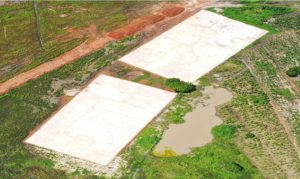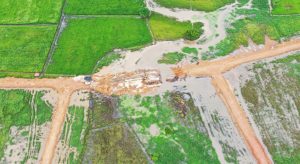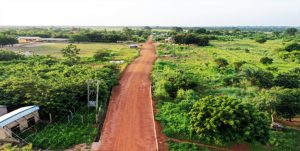The Ministry of Food and Agriculture, in collaboration with the International Fund for Agricultural Development (IFAD), has held a ceremony at Tordzinu, in the Volta Region, where various infrastructure projects under the Emergency Support to Rural Livelihoods and Food Systems Exposed to COVID-19 (ESRF) programme were handed over to communities across the country.

The infrastructure intervention, according to the ministry is worth $3,289,009. The same ceremony was also used to hand over food processing equipment worth $1.7 million to the beneficiary communities.
The ESRF project, launched by the Government of Ghana in response to the COVID-19 pandemic, has made substantial contributions to the country’s food security and agricultural sector.
Over the past three years, the project has implemented various interventions, including providing Personal Protective Equipment to 26,700 supply chain actors, fertilizers and improved seeds to 24,782 smallholder farmers, cash transfers to 5,000 vulnerable households, training for 1,000 smallholder farmers and provision of small-scale food processing equipment to 5,500 farmers.

The Minister of Food and Agriculture, Dr. Bryan Acheampong, highlighted the project’s achievements at the ceremony. He revealed that the project has constructed farm tracks, water harvesting facilities, drying platforms and boreholes in various regions across the country.
These projects are expected to provide market access to more than 5,500 residents in surrounding communities and serve as a source of potable water in most of these communities.
Dr. Bryan thanked all stakeholders involved in the project’s success and commended the Country Director of IFAD for her guidance and cooperation during implementation.
The project managers have worked closely with beneficiary communities and individuals to ensure sustainability and ownership of the projects.
The handing-over ceremony is a testament to the government’s commitment to empowering smallholder farmers and improving food security in Ghana.

The projects are expected to have a significant impact on the lives of beneficiaries and contribute to the overall growth of the agricultural sector.
“I am optimistic about the significant impact these interventions will have on the lives of our smallholder farmers and beneficiary communities,” said Dr. Bryan.
“These projects not only equip them with tools for agricultural success but empower them to withstand challenges posed by COVID-19 and climate change.”
The Ministry of Food and Agriculture is encouraging beneficiary groups and communities to take charge of maintaining these facilities, recognising them as lifelines that will sustain their livelihoods.
Joint efforts in maintenance will not only ensure the longevity of the infrastructure but also foster a sense of community pride and resilience.
With these projects, the government is committed to building a resilient and sustainable agricultural sector that propels Ghana towards prosperity.









